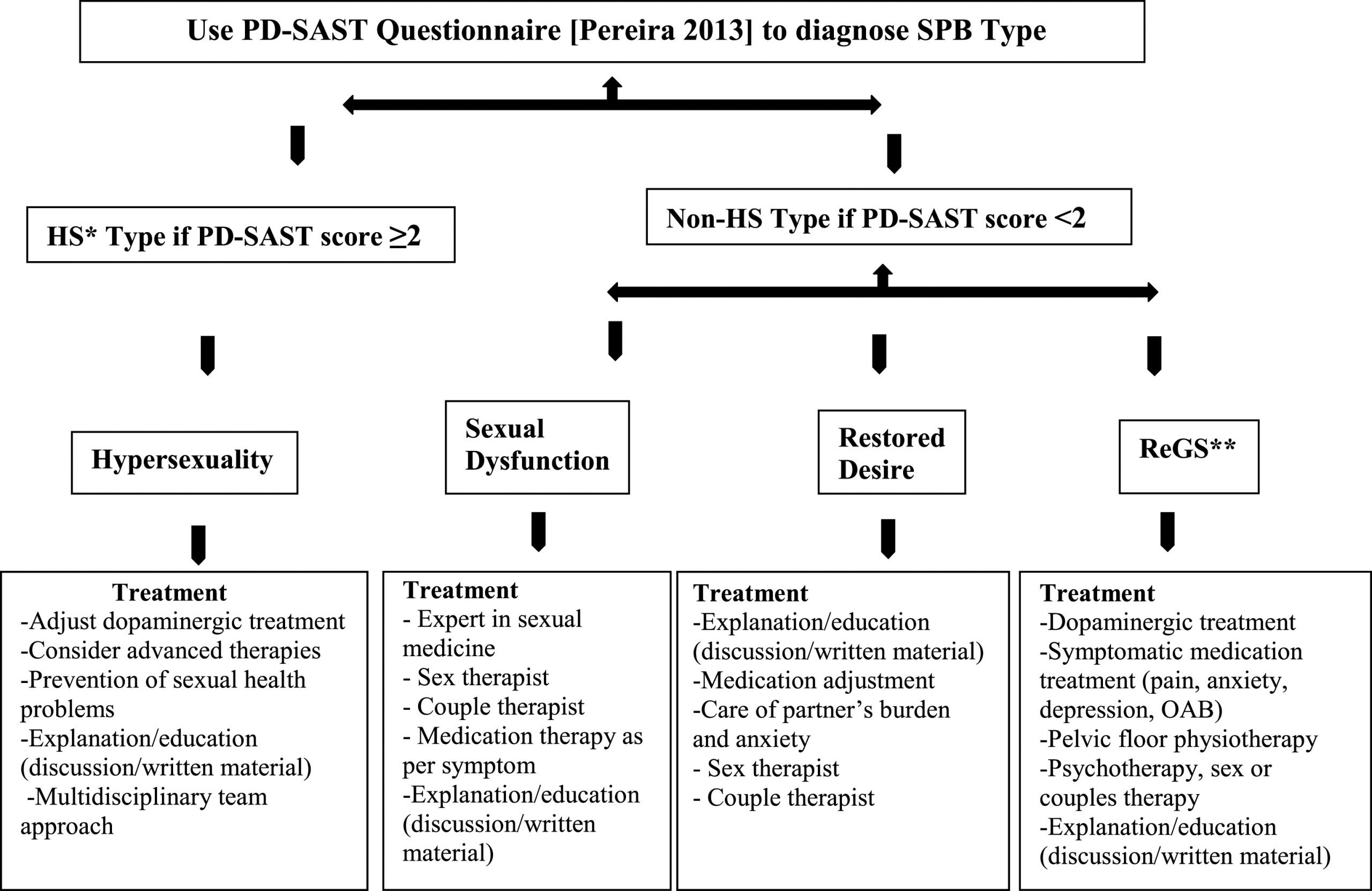Parkinsons Disease Sexual Issues For Couples
The demands and challenges of Parkinsons may derail a couples sexual dynamics. Issues may include:
- The person with Parkinsons has reduced mobility, which may force them to take a more passive role in lovemaking.
- Symptoms of Parkinsons tend to worsen at night, which may prompt the couple to sleep in separate bedrooms. This arrangement reduces opportunities for spontaneous sex.
- The couple may have firmly established roles. Parkinsons can dramatically change each persons role and this sudden unfamiliarity may stall aspects of the relationship, including sex.
- The way each person handles the diagnosis and daily demands of Parkinsons may cause friction. Communication problems can spill over into the bedroom.
- Parkinsons can disrupt a couples lovemaking routine in many ways. Further problems will arise if the couple are unable or unwilling to make changes to their sexual attitudes and habits.
The Research On Sex And Parkinsons
The idea that sex is good for our health is not new. Various scientific studies along with anecdotal evidence validate the positive side effects of sex. A study conducted by Dr. Yvonne K. Fulbright, a sexual health expert and professor at American University, concluded that sex enhances the immune system and that sexually active people take fewer sick days. New York Post columnist Karol Markowicz described sex as a reliever of stress that has been tied to better sleep and even lowering some cancer risks.
As it turns out, sex and Parkinsons disease have something in common: dopamine. Dopamine, sometimes described as the feel-good chemical released in the brain, is a chemical neurotransmitter involved with many important functions in the body such as movement and emotional response.
Parkinsons disease results from the death of dopamine-generating cells in the substantia nigra region of the brain. The more dopamine we lose, the more debilitating the symptoms become. In 1970, the Food and Drug Administration approved a drug called levodopa, also known as sinemet or carbo-levodopa, which increases dopamine in the brain. The drug revolutionized the treatment of Parkinson disease and, although not a cure, it has enabled people to live more independently.
What if we could put the natural dopamine depleted due to Parkinsons disease but still there to work? Could orgasms help defeat the advance of the disease?
Sex And General Health
According to Marina Picillo, though the data is new, the relationship between sexual activity and improved general health, is not.
Previous evidence showed a close relationship between sexual health and general health both in healthy individuals and in patients affected by other chronic diseases. The World Health Organization has also declared that sexual health is a pivotal aspect of life.
Past studies have shown that sex can reduce stress, lower blood pressure and boost the immune system.
Picillo emphasised that the benefits of sexual activity extend beyond the strictly medical.
It should not be limited to maintaining full genital functions but, rather, to achieving pleasure and satisfaction, reducing anxiety and concerns, increasing intimate couple communication and reducing relationship tension.
She said that the data could encourage clinicians and Parkinsons patients especially women to open up the conversation about sexual activity.
If patients understand improving sexual function may significantly improve their quality of life and, thus, their condition, they may be more open to talk about that with health providers. This may be of particular interest for women, who are less prone to talk about sex due to societal attitudes.
Read more:
Don’t Miss: Can Parkinsons Be Passed Down
Hypothalamic Neurons And Dopamine
In experimental animals, dopamine is known to facilitate erection and mating behaviors. The MPOA/PVN receives projections from the nigral dopaminergic neurons . A microdialysis study showed that the dopamine concentration in the MPOA was increased by sexual stimulation. It is reported that dopamine D1/ D2 receptors in the hypothalamus participate in erection, whereas only D2 receptors participate in ejaculation. Pathology studies have shown that the hypothalamus is affected in PD . Recently, a polymorphism in the dopamine D4 receptor gene has been shown to contribute to individual differences in human sexual behavior . Prolactinergic neurons are thought to be inhibitory to sexual function. Serum prolactin levels increase after orgasm in healthy men. Prolactin-producing pituitary tumors often cause gynecomastia and erectile dysfunction in male patients. Hyperprolactinemia occurs after the use of sulpiride, metoclopramide, and chlorpromazine . Therefore, dopaminergic neurons seem to facilitate oxytocinergic neurons, whereas they inhibit prolactinergic neurons. Some de novo PD patients have hyperprolactinemia , which may contribute to erectile dysfunction in those patients.
Fig. 1.
Sd In Patients Affects Their Partner’s Sexuality

Studies investigating the correlation between male SD and the partner’s sexual function support the idea that SD is a couple’s problem, affecting both men and women in nonparkinsonian samples.- Sexual and relationship dissatisfaction among patients with PD paralleled that of their partners., , The burden and increased depression in the caregiving partner can explain the sexual deterioration reported among spouses and partners of patients with PD.,
Read Also: Caring For Someone With Parkinson’s Disease
Parkinsons Disease In Women And Men: Whats The Difference
Article type: Review Article
Authors: Cerri, Silvia | Mus, Liudmila | Blandini, Fabio *
Affiliations: Laboratory of Cellular and Molecular Neurobiology, IRCCS Mondino Foundation, Pavia, Italy
Correspondence: Correspondence to: Dr. Fabio Blandini, IRCCS Mondino Foundation, Via Mondino 2, 27100 Pavia, Italy. Tel.: +39 0382 380416 E-mail: .
Keywords: Parkinsons disease, sex, gender, risk factors, estrogens, signs and symptoms, dopaminergic neurons, neuroinflammation, oxidative stress
DOI: 10.3233/JPD-191683
Journal: Journal of Parkinson’s Disease, vol. 9, no. 3, pp. 501-515, 2019
Abstract
Intimacy Tips From People With Pd And Their Partners
Remember that the right to share love, touch and intimate moments accompanies us along our life, said Gila.
For more information about sex therapy or where to find a sex therapist near you, contact the Parkinsons Foundation free Helpline at 1-800-4PD-INFO or .
You May Like: Does Amy Klobuchar Have Parkinson’s
Sex And Gender Aspects In Motor Features
PD is primarily known as a clinical syndrome described as Parkinsonism, which entails bradykinesia in combination with at least one of the following: resting tremor, rigidity, or postural instability . As the disease progresses, people with PD are prone to develop fluctuations in motor impairments related to dopaminergic therapy, as well as to freezing of gait . Several differences in motor features between men and women with PD have been reported and have been summarized elsewhere . However, the relevance of these differences for care provision to people with PD remains largely unknown.
The potential impact of sex or gender differences on multidisciplinary care for mobility impairments comes from other fields of medicine, such as recent recommendations for osteoporosis screening guidelines based on underlying sex differences . Osteoporosis predominantly affects postmenopausal females but also impacts many elderly males . Given the higher mortality of men with bone fractures, several osteoporosis, and endocrinology societies now recommend screening in all men above 65 or 70 years , but this recommendation is not routinely implemented in clinical practice .
Table 1. Considerations for sex- and gender sensitive multidisciplinary PD care.
The Sex Gene Sry And Parkinsons Disease
Parkinsons disease, a debilitating neurodegenerative disease common in elderly people, is twice as prevalent in men than in women.
A new study suggests the sex gene plays a role in the loss of dopamine-making neurons that underlies this disease.
As well as providing a spectacular example of how genes act differently in male and female brains, this discovery may lead to a new treatment option for men suffering from Parkinsons disease.
Recommended Reading: Are There Stages Of Parkinson’s Disease
Sry And Parkinsons Disease
In humans and other mammals, females have two X chromosomes , and males a single X and a male-specific Y chromosome . SRY is the master gene on the Y chromosome that determines the male sex of a baby in the embryo.
But research has found SRY seems to be active in other parts of the body, too. In mice and rats, SRY is active in the brain, and in humans its expressed in several tissues and organs, including the brain.
Read more:What makes you a man or a woman? Geneticist Jenny Graves explains
SRY has been found to be expressed at abnormally high levels in the brains of mice and rats mutated to have symptoms of Parkinsons disease, and in animals where the disease was induced by chemical treatment.
Previous work showed overactivity of the SRY gene destroys neurons that synthesise dopamine. Were not entirely sure how this happens, but given the link between dopamine production and Parkinsons disease, it might partly explain why Parkinsons disease affects males more commonly than females.
This new study now shows that interfering with SRY expression in the brains of rodents with Parkinsons disease ameliorates the severity of symptoms. Vince Harley and Joohyung Lee from the Hudson Institute in Melbourne found that quashing SRY action prevented or mitigated the reduced mobility of male animals with Parkinsons disease.
So, suppressing the activity of SRY in neurons of Parkinsons disease patients could ameliorate their symptoms.
Sex Differences In Animal Models Of Pd
Animal models have been used as important tools to assess the actions of therapeutic compounds. In this regard, MPTP is a substance that has been used to induce PD in various animal studies and is a prodrug to the neurotoxin MPP+, which causes symptoms of PD due to destruction of dopaminergic neurons in the substantia nigra, thus depleting striatal dopamine . Using MPTP-treated mice, some researchers
Also Check: Early Parkinson’s Symptoms In Young Adults
Influence Of Sex On Nms: Progression Analysis
We analyzed mean values of NMS scores for HC and PD cohorts for up to 7 years but not for SWEDD cohorts due to lack of sufficient data .
Progression of NMS in PD cohort categorized by sex. NMS mean scores were categorized by sex of patient or male ) for Parkinson’s disease and healthy controls . NMS scales analyzed are displayed A through P indicating the score range in the title of individual graphs. Higher number indicates more dysfunction except for MoCA Cognition . Differences in mean scores within PD and HC cohorts were evaluated using two-way ANOVA with multiple comparisons for each time point. Statistically significant differences within cohorts are indicated by an asterisk. Statistically significant ANOVA interaction of time and cohort on NMS scale are indicated by #p< 0.05.
Within the PD cohort, females experienced more constipation ), thermoregulatory dysfunction ), and anxious mood ). Males experienced more sexual ), urinary ), cognitive and ), and sleep dysfunction over 7 years.
Contact Our Information And Referral Helpline

The Parkinson Canada Information and Referral Helpline is a toll-free Canada-wide number for people living with Parkinsons, their caregivers and health care professionals. We provide free and confidential non-medical information and referral services. When you have questions or need assistance, our information and referral staff help connect you with resources and community programs and services that can help you. We provide help by phone or email, Monday to Friday, 9:00 a.m. 5:00 p.m. ET.
Also Check: Which Part Of The Brain Is Affected By Parkinson’s Disease
Pharmacological Therapy Of Motor Symptoms
In the absence of a disease-modifying therapy, PD treatment is currently based on the control of motor symptoms by levodopa supplementation. However, long-term therapy with levodopa is associated with the development of motor complications, such as levodopa-induced-dyskinesia, wearing off and on-off phenomena. It is generally assumed that dyskinesia is associated with sustained levodopa plasma levels . Commonly, women present greater levodopa bioavailability, which is further supported by lower levodopa clearance levels . Dopamine bioavailability in the central nervous system is dependent on the activity of two catabolic enzymes: catechol-O-methyltransferase and monoamine oxidase-B , whose encoding genes are located on the chromosome 22 and X chromosome, respectively . A study that explored the relationship between MAO-B or COMT functional SNPs and levodopa therapy reported that male PD patients carrying the MAO-B G allele had a 2.84-fold increased risk of developing motor complications when treated with high doses of levodopa .
No Need To Be An Expert In Sexual Medicine
It is important to stress that no one needs to be an expert in sexual medicine to provide meaningful care. Being aware of the sexual aspects of PD, inquiring about sexual changes and problems, providing proper information and explanations to reduce anxiety, and then prescribing an appropriate medication or referring to experts are exactly what most patients and their partners need. They need recognition of their basic right to remain a human sexual being despite their progressive disease. Because of the complexity of sexual problems, they should be handled with multidisciplinary team cooperation. It is recommended to raise sexual issues in staff meetings and in case assessments by sharing dilemmas and knowledge.
Recommended Reading: What Happens With Parkinson’s
Actions For This Page
- A person who has Parkinsons disease faces many challenges, including the possibility of reduced sexual feeling and function.
- Parkinsons can affect the partners sexuality too.
- Communication is the best remedy for all types of relationship problems, including sexual problems.
- Always see your doctor if you are concerned about your medical condition, treatment, sexuality or sexual relationship.
Sexual Effects Of Parkinsons Medications
Sometimes persons with PD can experience a dramatic increase in sexual interest and activity. When dosages on some PD medications are too high it sometimes becomes more difficult for some people to control their impulses.
These impulse control disorders may involve things like excessive spending and gambling, but also too much interest in sexual activity. It is very important for people with PD to be aware of this and to have their doctor adjust their medications at the first signs of these issues.
The medications most often related to impulse control problems are the dopamine agonists rather than levodopa, per se. The good news is that impulse control problems appear to be ‘dose-dependent, meaning that the unwanted behaviors go away when you reduce how much of the drug you are taking.
Never stop any medication, or lower your dose, without your doctor’s OK.
Don’t Miss: Does Parkinson’s Make You Tired
Disease Predictors And Risk Factors
The etiology of PD is not well understood. Despite the presence of familial cases, PD is substantially an idiopathic, multi-factorial disease caused by the interplay between genetic and environmental factors. Genetic studies have identified increasing numbers of risk polymorphisms, whereas little is still known about environmental risk factors and how these affect PD risk.
Heinzel and coll. recently highlighted the sex-related differences in prodromal PD. They concluded that women and men show distinctive prodromal markers of PD , suggesting that these differences should be taken into account to guarantee the diagnostic accuracy of prodromal PD .
Bowel And Bladder Problems
Fear of incontinence during sexual activity may have a negative impact not only on self-esteem, but also on sexual arousal, especially in women with Parkinson’s or female partners.
If you experience urinary incontinence, certain drug treatments may be helpful. Emptying your bladder and avoiding drinks for two hours before intercourse may help with continence.
If you experience bowel incontinence, an enema before intercourse or using an anal plug may be helpful.
Read Also: Can Parkinson’s Start In The Legs
Sexual Problems In Parkinsons
As with any subject that makes us the least bit embarrassed, sexual problems often are swept under the rug. The subject is seldom mentioned outside the bedroom and may rarely be brought up to your doctor. Still, sexual changes are a common part of getting older and occur frequently among people with Parkinsons.
You can continue to have healthy sexual relationships while living with Parkinson’s disease , but you may experience new challenges. The symptoms of Parkinson’s can create barriers to intimacy, and many people with Parkinson’s experience emotions that affect their sexual relationships, such as anxiety, fear and insecurity about physical changes. The stress of caring for a loved one with PD can make you feel tired, anxious or even resentful. Talking with your partner is key to finding solutions that work for both of you. If you can remain open, honest and patient and remember that physical closeness takes many forms you and your partner can, together, discover many ways to adapt.
Your doctor is a source of help. Treatments and strategies are available, but people often don’t talk to their doctors about sexual matters. Sharing this aspect of your life with PD with your physician can help you maintain a healthy sexual relationship and quality of life.
Parkinson’s symptoms and medications can bring changes in sexual health:
Sex Differences In Basic Disease Characteristics And In Nigrostriatal Degeneration In Parkinsons Disease

There are sex differences related to the age at onset of PD and to the amount and progression of nigrostriatal degeneration. To assess these differences, Haaxma et al. studied 253 patients with a disease duration of less than 10years and who were not treated with levodopa or dopamine agonists. According to these researchers, age at onset was 53.4years old in women and 51.3years old in men. Furthermore, they measured the amount and progression of nigrostriatal degeneration using [123
You May Like: How Serious Is Parkinson’s Disease
Parkinson’s And Female Sex Drive
Common sexual issues in women with Parkinson’s disease include loss of lubrication and involuntary urination during sex. Sex can be uncomfortable because of a lack of lubrication and desire.
For women with PD who have experienced menopause, the decline in sexual interest may be due to both menopause and PD. Hormone replacement therapy may help the physical effects of menopause.
An added benefit is that such therapy can help keep bones strong and flexible. Never, however, take any hormonal supplements without consulting with your doctor first.